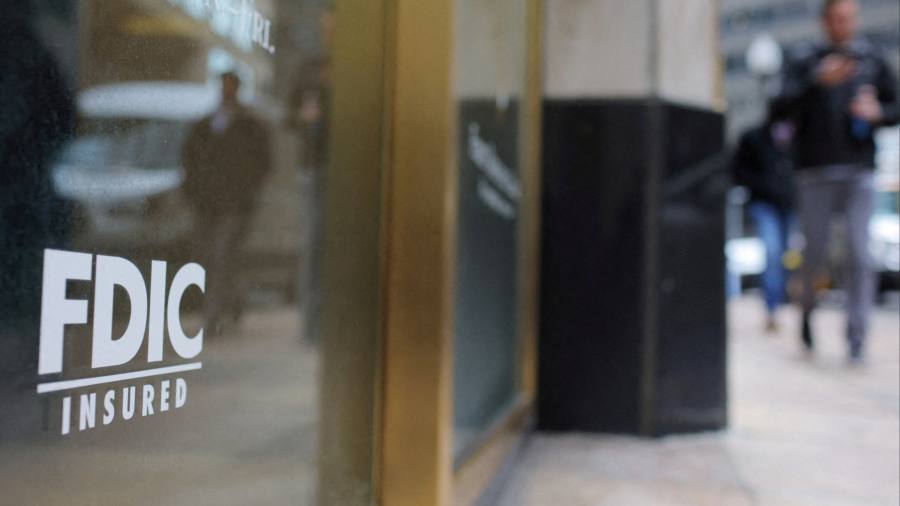Receive free US banks updates
We’ll send you a myFT Daily Digest email rounding up the latest US banks news every morning.
A top US banking regulator has accused some US lenders of misreporting deposit data at a time of industry tension over how deposit levels will be used to assess the cost of this year’s failures of Silicon Valley Bank and Signature Bank.
The Federal Deposit Insurance Corporation, in an open letter to bank chief executives on Monday, said it had “observed that some depository institutions” had “incorrectly” lowered the value of their uninsured deposits.
The letter comes amid concerns that some banks have restated deposit data in ways that reduce what they would owe as part of a “special assessment” proposed by the FDIC in May after the collapse of SVB and Signature Bank.
Bank analysts at S&P Global noted that an unusually large number of banks had amended their fourth-quarter financial statements to lower the value of their uninsured deposits. The analysts said that the restatements could lower by tens of millions of dollars, and at least in one instance as much as $300mn, what each bank would have to pay in the FDIC’s special assessment.
Midsized US lender Zions claimed in a letter submitted last week to the FDIC that alleged several big banks had refiled their year-end financial statements to report a lower level of uninsured deposits.
The FDIC’s letter called on banks that had incorrectly reported their deposits data to amend their so-called Call Report, which is the financial statement banks file to it, and reminded them that top executives are required to sign off on the accuracy of such reports.
“Consistent with the requirement to file accurate Call Reports, insured financial institutions” that have incorrectly reported uninsured deposits should amend their Call Reports by making the appropriate changes to the data,” the FDIC wrote.
“I am surprised by the emergence of this error given that the procedure for calculating insured deposits has not been altered for some time,” said Bert Ely, a veteran banking consultant and a close watcher of the FDIC.
Banks have been under pressure to reduce their reliance on uninsured deposits after the collapse of SVB and Signature. What’s more, uninsured deposits are a crucial metric in how much each bank will have to pay under the FDIC’s proposed a special assessment for this year’s big failures.
The FDIC has proposed to calculate the fees based on banks’ uninsured deposits, as $15.8bn of the $18.5bn cost of the SVB and Signature bailouts were due to the coverage of accounts larger than the FDIC’s normal $250,000 insured limit.
The regulator wants to apply the assessment based on the value of the banks’ uninsured deposits at the end of 2022. Nearly 56 per cent of deposits in the US were above the $250,000 per account limit and uncovered at the end of the first quarter, up from 52 per cent three months before.
The FDIC didn’t single out any individual banks. It was unclear which banks, if any, will have to restate their financial records.
Earlier this month, the S&P said 55 banks this year had restated their fourth-quarter figure, compared with just 14 in the same quarter the prior year. S&P said the majority of the restatements resulted in lower uninsured deposits.
Bank of America had the largest restatement, cutting its uninsured deposits by $125bn, or nearly 14 per cent, according to the report. Based on its lower uninsured deposits, S&P said BofA’s special assessment would drop to $1.95bn, down from $2.26bn.
Huntington National Bank, the 26th largest in the US, had the biggest percentage drop in uninsured deposits after its restatement, falling nearly 40 per cent to just over $50bn, according to S&P, which calculated that the restatement would save Huntington nearly $85mn.
BofA declined to comment. It had told S&P that its restatement had to do with “intra-company” deposits that should have been excluded from uninsured deposits. A source close to BofA told the Financial Times that the restatement, which was made in early May, had been previously planned and was not tied to the FDIC’s special assessment.
Huntington did not respond to a request for comment.
Zions chief financial officer Paul Burdiss told the FT the point of his letter was “not to imply or assert that any bank is ‘gaming’ the system or acting in any nefarious manner”. Instead, its aim was to point out problems with the way the FDIC has proposed to impose the SVB-related assessment.
Zions’ letter was one of more than 200 submitted to the FDIC during its 60-day comment period. Like Zions, many midsized banks wrote letters that said the nation’s biggest banks should pay the cost of the failures of SVB and Signature because they had benefited the most from the recent regional banking turmoil.
In a comment letter, the Financial Services Forum, a lobby group representing eight of the largest US banks including JPMorgan Chase and BofA, said they were already subject to the highest costs of regulation and “served as a source of strength and resilience” during the recent banking crisis. The group criticised the FDIC for basing its assessment on size rather than the riskiness of different banks’ business models.
Additional reporting by Joshua Franklin in New York
Read the full article here




